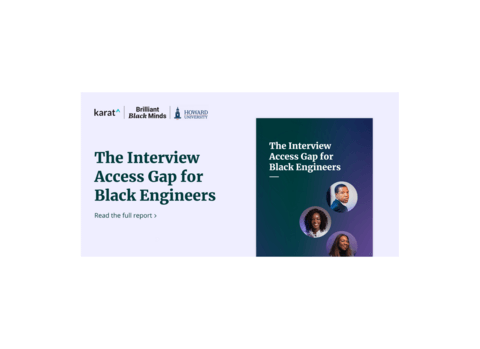New Research from Karat and Howard University Sheds Light on Access Challenges Facing Black Software Engineers

From the Howard Newsroom:
WASHINGTON - Researchers from Howard University and Karat, the world’s leader in technical interviewing, today released new research exploring key factors that can help more Black software engineers enter the tech industry and excel in their careers. According to the U.S. Bureau of Labor Statistics, Black engineers comprised just 6 percent of all computer programmers in the U.S. in 2020, and this research shines a light on the challenges and opportunities that exist to improve representation.
The Interview Access Gap for Black Engineers identifies a number of socioeconomic and systemic barriers young Black talent face to get jobs in tech. The research study was co-authored by Dr. Legand Burge, III, professor of computer science at Howard University, Dr. Katherine Picho-Kiroga, assistant professor of educational psychology at Howard University, and Portia Kibble Smith, head of diversity and inclusion at Karat.
Karat’s Brilliant Black Minds program provides Black software engineers free practice interviews with live feedback to expose students to the components of a technical interview alongside career development workshops.
“This research highlights the importance of transparency and making information about interviews readily available for candidates,” Burge said. “The students in my classes are incredibly resourceful, they’ve had to hustle their entire lives. These are positive traits that hiring managers look for, but they’re hard to demonstrate in a traditional job interview.”
Researchers say the study also reinforces why practice interview programs like Brilliant Black Minds are so critical for closing the access gap and empowering more Black engineers.
“The lack of representation of Black engineers in tech is a barrier to entry for the next generation,” said Kibble Smith. “A lot of the HBCU students we interviewed are first-generation college students. They don’t have a clear understanding of what goes on in a technical interview until they’re interviewing for their first engineering internship, and they don’t have anyone in their networks to help them prepare.”
Key findings
Structural inequities delay exposure to computer science education and make it more difficult for Black software engineers to start careers in tech.
- Respondents who have had software engineering internships had access to their first personal computer nearly a full year earlier than those who have not had an internship.
- They also had their first exposure to computer science education an average of two and a half years earlier.
- Research from Google suggests that Black students are less likely to have classes dedicated to computer science at school than white students (47 percent vs. 58 percent, respectively).
Access to people working in the tech sector increase interview confidence, but just six percent of software engineers are Black.
- Nearly three-quarters of the survey respondents knew fewer than five people working in big tech, and more than 25 percent reported knowing none.
- Professional networking was even more limited in the tech startup space, with 83 percent of respondents knowing fewer than five people working at startups, and 43 percent not having any contacts.
Interview practice helps students overcome the lack of structural exposure and access to the technology industry.
- Just 39 percent of respondents who had never taken a practice interview believed that they were either somewhat or very likely to succeed in a technical interview.
- Confidence levels increased with more practice, with those numbers climbing to 79 percent of people with more than three practice interviews.
- This also translated to career opportunities. Fifty-five percent of survey respondents who have taken more than three practice interviews have had an engineering internship, compared to just nine percent of those who have never had a practice interview
Closing the access gap
Adding transparency to the hiring process and building methods for underrepresented software engineering candidates to practice technical interviews are two ways that tech companies can close the access gap and reduce interview anxiety. Strategies for accomplishing this include publishing sample interview questions online and giving candidates multiple opportunities to interview. Both of these practices help demystify technical hiring for engineers from nontraditional backgrounds. This not only creates a more equitable talent pipeline but also a more efficient and effective way to hire the best engineers.
“The program has helped participants build confidence, hone their technical interviewing skills and ultimately get summer internships and full-time jobs,” added Kibble Smith. “Interview scores from the Fall and Spring practice seasons showed promising results, with more than three-quarters of students maintaining or improving their performance.”
The full report includes survey responses and feedback from focus groups conducted in the Spring of 2021. More than 300 Black computer science students and alumni from other universities, including Howard University, Morehouse College, and University of North Carolina - Charlotte participated.
